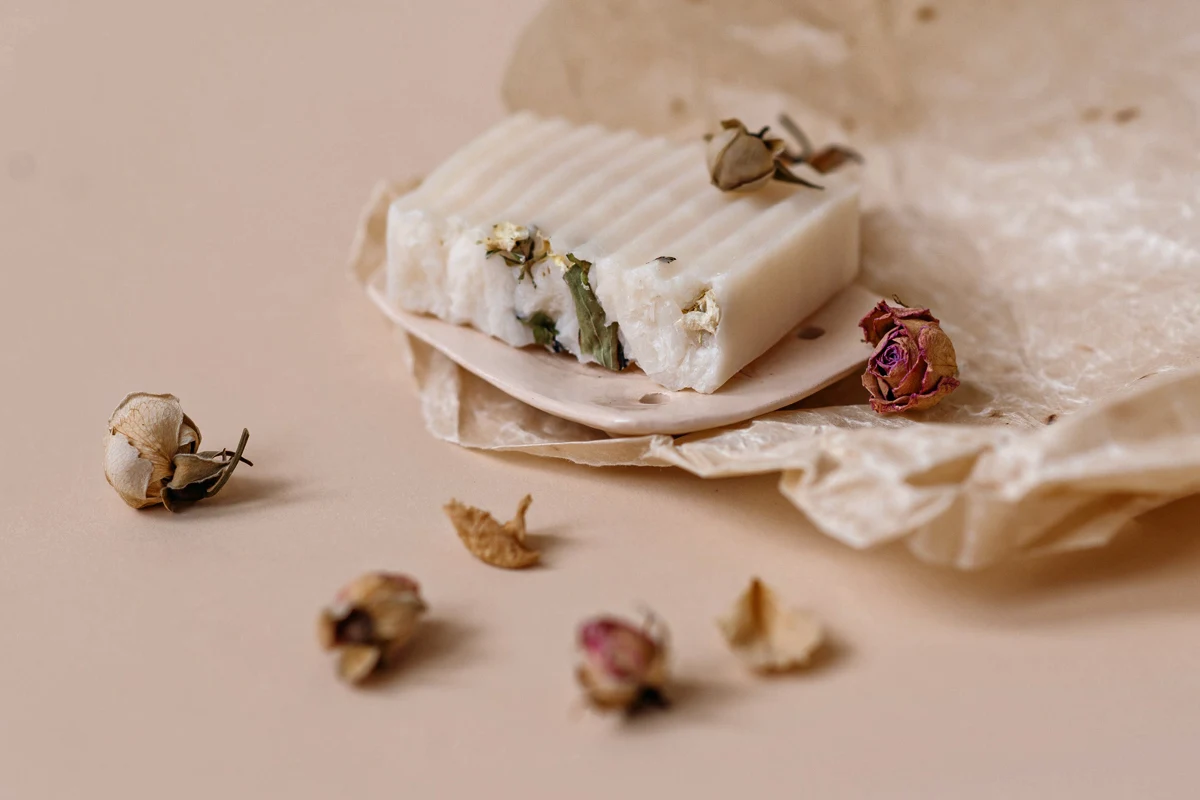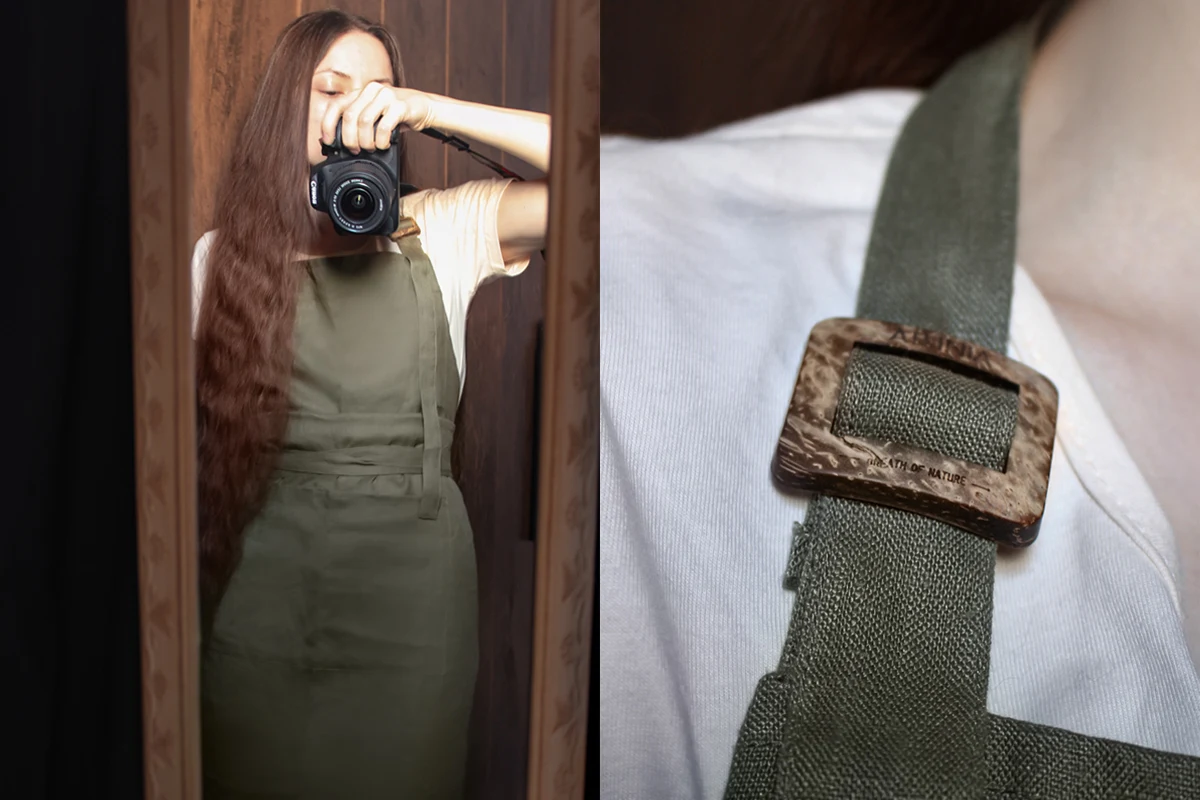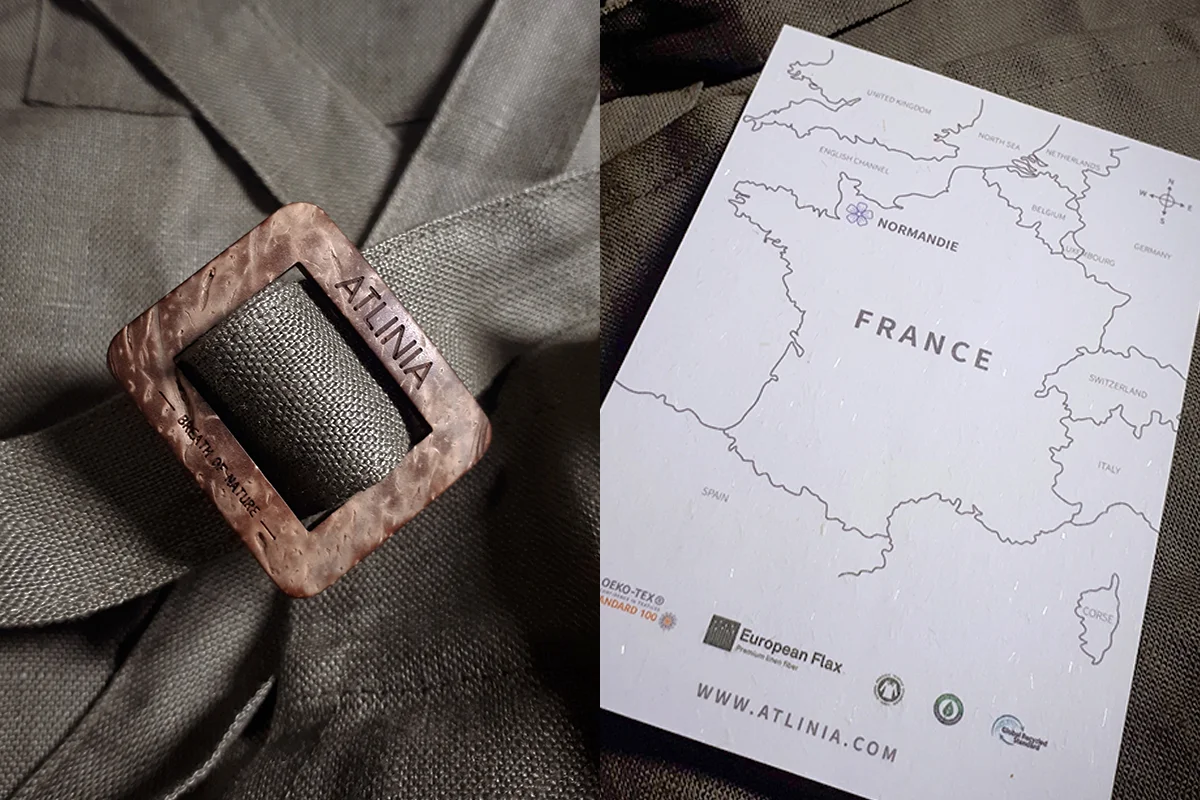Even though you can absolutely recycle your old synthetic loofah, they may still end up in the soil or ocean, polluting the environment. Yet, Mother Nature has thought about the importance of exfoliation, a growing natural alternative to a favorite washing tool.
2. Natural Kitchen Utensils Vs. Synthetic
Talking about the kitchen is one of the places in the house that ends up cluttered with all things polyester: sponges, towels, napkins, and other things. Even my old apron, which I always used while baking, was synthetic. Luckily, I had an awesome opportunity to upgrade it to a very good-looking
chef apron* by Atlinia.
Linen is considered to be one of the most biodegradable natural materials. Compared to cotton, linen has a less ecological environment, it is more sustainable and durable. Atlinia uses only 100% quality linen originating from the Normandy region in France for all products.
I'm the lucky owner of a bib apron, which is the most traditional and popular apron style among professionals and amateurs. The apron has an adjustable neck strap, two long ties on the waist, and two large pockets in the front. It completely covers the torso and legs, protecting you from unwanted cooking stains. I picked the khaki shade, hoping to conceal more stains, but the natural oatmeal color is simply fantastic. Such linen aprons give me the strongest cottagecore vibes, and I love them!
Substituting all of your synthetic kitchen utensils and cloth with natural bamboo, cotton, and linen alternatives is an important step toward a cleaner environment. This is the minimum and one of the easiest things we all can do to reduce synthetic waste.
3. Cloth Vs. Cotton Swabs
Did you know that we aren't actually supposed to use cotton swabs to clean ears? These cotton sticks are not only dangerous to the environment but can also be
bad for hearing. You can ask any medical specialist, and they will give you a lecture about harmful Q-tips. Regular usage of cotton swabs may lead to wax build-up and, what is worth, punctured eardrums.
As an alternative to your favorite Q-tips, use a soft cotton pad, or an old t-shirt to 'lightly' clean your ears after the shower. WebMD, in their article 'Cleaning Your Ears' suggests using a small amount of hydrogen peroxide or natural oil to make the ear wax softer and easier to remove.
4. Sustainable Packaging & Refills Vs. Drugstore Bath Products
I know that many drugstore consumers complain about the price of sustainable
bath and body products. I'm one of those people, who can't afford to pay expensive for shower gel. However, in the past few years, a lot of eco-friendly brands, that pack their products in sustainable packaging and offer refills, have become more budget-friendly. Plus, a bar of solid shampoo lasts far longer than a bottle of regular drugstore shampoo.
5. Reusable Sanitary Pads Vs. Synthetic Pads
Synthetic tampons and sanitary pads aren't only harmful to the environment. Just like cotton swabs, they can cause health issues. There are various chemicals used in tampon and pad production, which, of course, stay between the fibers. The health risks are considered to be low, but, paired with the environmental pollution (pads and tampons are not recyclable), regular usage turns into a bigger problem.
As an alternative, I suggest you try reusable pads and menstrual cups. Reusable pads are made with cotton. They are light, breathable, and much more comfortable than regular synthetic pads. Shopping for handmade pads is a good way to support your local small businesses. Menstrual cups are a great, and affordable alternative to regular tampons. They are not less risky to the health, but much more environmentally friendly as they can be used for up to 5-10 years.
6. Reusable Makeup Cloth Vs. Makeup Remover Wipes
Do you still use wet wipes to remove your makeup?
Synthetic wipes are not recyclable, ending up in drains, soil, and polite ocean. In The Guardian article 'Wet wipes found on British beaches up more than 50% in 2014' an MCS conservation officer Charlotte Coombes talked about the harm these wet wipes cause to marine life.
If you are looking for a way to reduce waste, I have an awesome alternative — a reusable makeup cloth. Usually, it is made of a soft synthetic material like microfiber. All you'll need to make it work is to damp it in warm water, and it wipes the makeup off right away. If you use waterproof makeup, use some micellar water to make your routine easier.
7. Reusable Water Bottle Vs. Plastic Bottle
There are numerous environmental pros when it comes to substituting plastic bottles with their reusable alternatives. It can be glass, steel, or even a sturdy plastic one. As long as you use your water bottle constantly and for a long time. Reusable water bottles are both budget and environmentally friendly.
Photo: Sarah Chai
8. Paper & Metal Straws Vs. Plastic Straw
Enough has been said about plastic straws and their harmful environmental impact. Apart from hurting animals, a single plastic straw releases plenty of chemicals, which are harmful to people, animals, and plants.
To reduce synthetic waste and, as a result, environmental pollution, use paper or metal straws. Paper drinking straws are 100 % biodegradable, but not very durable. Metal straws are more durable, they can be made of recycled metal, to begin with, and can be easily washed and reused in the future.
9. Reusable Grocery Bag Vs. Plastic Supermarket Bag
U.S. consumers use around 100 billion disposable plastic bags, which demand up to 12 million barrels of oil in production and end up, as always, in the world's oceans. These numbers, shown in the article ' Why Should You Replace Plastic Bags with Reusable Grocery Bags' by Factory Direct, reflect only U.S. consumption. Can you even imagine the worldwide numbers?
Who even wants to use those annoying noisy plastic bags, when you can replace them with a convenient grocery bag
made witj sustainable fabrics? A lot of stores and distributors even offer them for free, if you are a loyal customer or have a subscription. Plus, it is yet another way to support small businesses with style and help our planet.
10. Slow Fashion Vs. Fast Fashion
Shopping for fashion trends always fills a hole in the heart, but there are so many environmental and social problems that are hidden in fast fashion. It is an important matter for discussion. Saying no to low-quality clothing, fast fashion trends, and shopping for pleasure are the three steps that we can all undertake right now to reduce waste. I even started
building a capsule wardrobe to save time and money and make my contribution to a greener world.
Summarizing...
Whether you are only looking toward an eco-friendly lifestyle, going zero waste, or simply trying to make the first steps towards more environmentally friendly living, I hope this blog post was interesting and somehow useful to you. I believe that everyone can adopt very minor, but important habits that won't interfere with personal comfort making our planet greener. Do you agree?
Lots of love,
Liz










